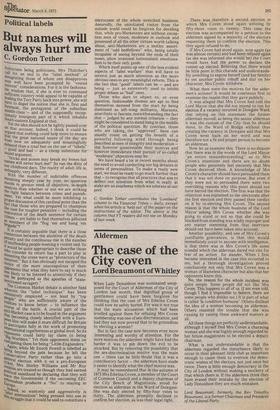Political labels
But names will always hurt me
C. Gordon Tether Politicians being politicians, Mrs Thatcher's call for an end to the "label method" of denigrating those of whom one disapproves may well have been prompted by "vested Interest" considerations. For it is the fashionable wisdom that, if she is ever to command sufficient country-wide appeal to be capable of leading the Tory Party back into power, she will have to dispel the notion that she is, first and foremost, the protagonist of the suburban middle-class — and of the supposedly exceptionally bourgeois part of it which inhabits South-eastern England at that. Yet the idea should not be lightly passed over on that account. Indeed, I think it could be argued that nothing could help more to ensure that the great national issues of the day are from now on adequately and meaningfully debated than a total ban on the use of "labels" — good and bad — as a cheap substitute for sound argument. "Sticks and stones may break my bones but names will neer hurt me!" So ran the ditty of our childhood days. The reality of adult life is, unhappily, very different. With the number of indictable offences Mounting steeply year by year, no question stands in greater need of objective, in-depth a,nalysis than whether or not we are striking tne right balance between crime and punishment. Yet what could be more inhibiting to Proper discussion of this cardinal point than the fact that those who are prepared to champion the case for tougher penalties — including the restoration of the death sentence for certain crimes — are liable to find themselves pilloried as members of the "flog 'ern and hang 'em brigade"? It is certainly arguable that there is a close connection between the abolition of the death Penalty and the continuous rise in the number Olunoffending people meeting a violent end. So lt Would be quite appropriate to describe those who consider its return has a part to play in sjetnrning the crime wave as "protectors of the Innocent." But it has obviously not escaped the notice of the more unscrupulous of their ?PPonents that what they have to say is much cess likely to be listened to attentively if they „an be portrayed as the apostles of "stateaanctioned savagery." 'rite Common Market debate is another field W_ herein the "label technique" has been extensively employed — not least by "top re eople" who are sufficiently aware of the alities to know better — to influence the course of the battle. A crucial part of the tari-Market case is to be found in the argument at becoming closely identified with a Euro?ean bloc will make it more difficult for Britain it° Participate fully in the work of promoting Iernational togetherness at global level. So its .)ponents could fairly lay claim to being c°1g,-Worlders." Yet their opponents insist on astigating them for being "Little-Englanders." beigain, while Mr Enoch Powell is labelled as Crig beyond the pale because he left the conservative Party rather than go into a trn,_eral election with it on a pro-European jecKet, Mrs Shirley Williams and Mr Roy ri.kn'Is are treated as though they had earned le cal sainthood by declaring that they will eaye the Government if the oncoming EEC ter en d um Produces a "No" to staying in tUrope. "iaihndieed, so wantonly and aggressively is this e' ammunition" being pressed into use in struggle that it could be said to constitute a
microcosm of the whole wretched business. Assuredly, the uninitiated visitor from the outside world could be forgiven for deciding that, while pro-Marketeers are without exception men of vision, moderate in outlook and possessed of all the other virtues worth talking about, anti-Marketeers are a motley assortment of "odd bedfellows" who, being totally incapable of seeing beyond the ends of their noses, allow irrational nationalistic emotionalism to be their only guide.
Which itself points up one of the less evident aspects of "label warfare" that will have to receive just as much attention as the more obvious ones in any meaningful reform. This is the fact that "good" labels can be — and are being — just as extensively used to inhibit proper debate as "bad" ones.
Those who dare to object to, or even question, fashionable themes are apt to find themselves damned from the start by being dismissed as left-wing militants, Marxists, anarchists or fascists, notwithstanding the fact that — judged by any normal criterion — they might be considered to stand bang in the middle of the political spectrum. By contrast, those who are takings, the "approved" lines can usually count on getting the benefit of a powerful following wind through being .described as men of integrity and moderation — this however questionable their motives and however immoderate their pursuit of so-called "moderate" objectives may be.
We have heard a lot in recent months about the need to avoid conducting our.big debates in terms of personalities. To make a really new start, we must be ready to go much further than that — to recognise that all practices that aim to deflect our attention from what is really at stake are an anathema which we tolerate at our peril.
C. Gordon Tether contributes the 'Lombard' column to the Financial Times — daily, except when his article is 'held out' of the paper on the instructions of the editor. The abrive is the column that FT readers did not see on Monday of last week.










































 Previous page
Previous page